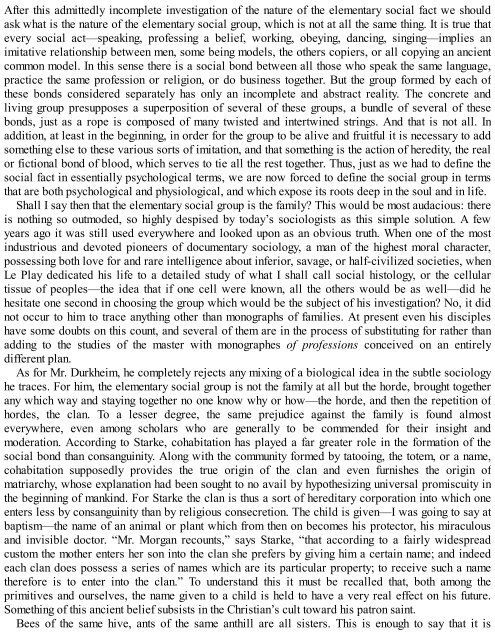3658925934
You also want an ePaper? Increase the reach of your titles
YUMPU automatically turns print PDFs into web optimized ePapers that Google loves.
After this admittedly incomplete investigation of the nature of the elementary social fact we should<br />
ask what is the nature of the elementary social group, which is not at all the same thing. It is true that<br />
every social act—speaking, professing a belief, working, obeying, dancing, singing—implies an<br />
imitative relationship between men, some being models, the others copiers, or all copying an ancient<br />
common model. In this sense there is a social bond between all those who speak the same language,<br />
practice the same profession or religion, or do business together. But the group formed by each of<br />
these bonds considered separately has only an incomplete and abstract reality. The concrete and<br />
living group presupposes a superposition of several of these groups, a bundle of several of these<br />
bonds, just as a rope is composed of many twisted and intertwined strings. And that is not all. In<br />
addition, at least in the beginning, in order for the group to be alive and fruitful it is necessary to add<br />
something else to these various sorts of imitation, and that something is the action of heredity, the real<br />
or fictional bond of blood, which serves to tie all the rest together. Thus, just as we had to define the<br />
social fact in essentially psychological terms, we are now forced to define the social group in terms<br />
that are both psychological and physiological, and which expose its roots deep in the soul and in life.<br />
Shall I say then that the elementary social group is the family? This would be most audacious: there<br />
is nothing so outmoded, so highly despised by today’s sociologists as this simple solution. A few<br />
years ago it was still used everywhere and looked upon as an obvious truth. When one of the most<br />
industrious and devoted pioneers of documentary sociology, a man of the highest moral character,<br />
possessing both love for and rare intelligence about inferior, savage, or half-civilized societies, when<br />
Le Play dedicated his life to a detailed study of what I shall call social histology, or the cellular<br />
tissue of peoples—the idea that if one cell were known, all the others would be as well—did he<br />
hesitate one second in choosing the group which would be the subject of his investigation? No, it did<br />
not occur to him to trace anything other than monographs of families. At present even his disciples<br />
have some doubts on this count, and several of them are in the process of substituting for rather than<br />
adding to the studies of the master with monographes of professions conceived on an entirely<br />
different plan.<br />
As for Mr. Durkheim, he completely rejects any mixing of a biological idea in the subtle sociology<br />
he traces. For him, the elementary social group is not the family at all but the horde, brought together<br />
any which way and staying together no one know why or how—the horde, and then the repetition of<br />
hordes, the clan. To a lesser degree, the same prejudice against the family is found almost<br />
everywhere, even among scholars who are generally to be commended for their insight and<br />
moderation. According to Starke, cohabitation has played a far greater role in the formation of the<br />
social bond than consanguinity. Along with the community formed by tatooing, the totem, or a name,<br />
cohabitation supposedly provides the true origin of the clan and even furnishes the origin of<br />
matriarchy, whose explanation had been sought to no avail by hypothesizing universal promiscuity in<br />
the beginning of mankind. For Starke the clan is thus a sort of hereditary corporation into which one<br />
enters less by consanguinity than by religious consecretion. The child is given—I was going to say at<br />
baptism—the name of an animal or plant which from then on becomes his protector, his miraculous<br />
and invisible doctor. “Mr. Morgan recounts,” says Starke, “that according to a fairly widespread<br />
custom the mother enters her son into the clan she prefers by giving him a certain name; and indeed<br />
each clan does possess a series of names which are its particular property; to receive such a name<br />
therefore is to enter into the clan.” To understand this it must be recalled that, both among the<br />
primitives and ourselves, the name given to a child is held to have a very real effect on his future.<br />
Something of this ancient belief subsists in the Christian’s cult toward his patron saint.<br />
Bees of the same hive, ants of the same anthill are all sisters. This is enough to say that it is









![Genki - An Integrated Course in Elementary Japanese II [Second Edition] (2011), WITH PDF BOOKMARKS!](https://img.yumpu.com/58322134/1/180x260/genki-an-integrated-course-in-elementary-japanese-ii-second-edition-2011-with-pdf-bookmarks.jpg?quality=85)
![Genki - An Integrated Course in Elementary Japanese I [Second Edition] (2011), WITH PDF BOOKMARKS!](https://img.yumpu.com/58322120/1/182x260/genki-an-integrated-course-in-elementary-japanese-i-second-edition-2011-with-pdf-bookmarks.jpg?quality=85)





